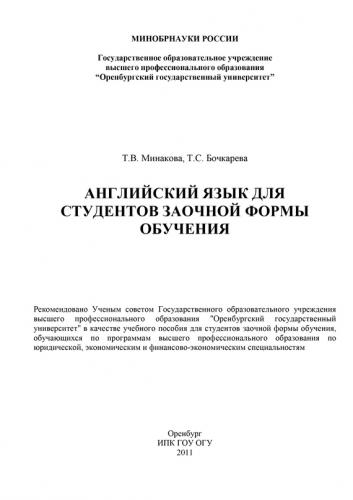An attempt is a punishable offense. But in determining the penalty the court must also take into consideration the character, the degree of the danger to society involved in the act committed by the guilty person, the degree to which the criminal intent has been put into effect, and the causes that prevent the full commission of the crime.
A crime is considered as committed when the guilty person has performed the act containing the corpus delicti of crime.
Desisting from completion of a crime is possible in the stages of preparation and attempt when a person having the possibility, of completing the crime, of his own free will abandons his criminal intent before its completion. He is then responsible only in the act performed by him contains the corpus delicti of another crime.
2.1.4.5 Задание 3. Ответьте на вопросы по текстам А, В, С, D, E, F
1 What does the Procurator’s office ensure?
2 What right has the procurator?
3 What kind of cases does a court of first instance examine?
4 Who are the participants in the trial?
5 What is the highest judicial organ in our country?
6 What is the main aim of Law?
7 What branches of Law in the Law System of our country do you know?
8 What does the Financial Law regulate?
9 How do the graduates administer justice?
10 What acts does Criminal Law define?
11 What leading principles of Russian Criminal Law do you know?
12 What is the Russian Court?
13 What is the basic Russian judicial organ?
14 What is the highest judicial organ?
15 What is the Procurator’s Office established for?
16 What stages does the criminal activity consist of?
17 What does an attempt mean?
18 What must the court take in to consideration?
19 When is a crime considered as committed?
2.2 Тексты II семестра
2.2.1 Тексты для студентов специальности «Юриспруденция»
2.2.1.1 Задание 1. Прочитайте и запомните следующие слова и словосочетания:
legal activities – правомерная, законная деятельность;
penalty – наказание;
witchcraft – колдовство;
runway slaves – беглые рабы;
stone pillar – каменная колонна;
divorce – развод;
marriage – брак;
revenge – месть;
punishment – показание;
to damage – наносить ущерб;
death penalty – смертная казнь;
blood feuds – кровная месть;
bride – невеста;
offender – преступник;
offense – правонарушение;
victim – жертва;
kidnap – похищать;
religious beliefs – религиозные верования;
harsh measures – жесткие меры;
government decisions – правительственные решения;
evidence – доказательство;
prominent – выдающийся;
solution – решение;
moderation – умеренность;
to permit – позволять, разрешать;
enslavement – порабощение;
fair – справедливый.
2.2.1.2 Задание 2. Прочитайте тексты А, В, С, D переведите их письменно
Text A. The Birth of Law
Rules and laws – and the conventions or customs from which they are descended – have been a part of human life ever since our ancestors first began to live in large and settled groups. But our knowledge is vague of laws that were in effect before the invention of writing in about 3500 B.C. The earliest known legal text was written by Ur-Nammu, a king of the Mesopotamian city of Ur, in about 2100 B.C. It dealt largely with compensation for bodily injuries, and with the penalties for witchcraft and runaway slaves.
Text B. Laws of Babylon
One of the most detailed ancient legal codes was drawn up in about 1758 B.C. by Hammurabi, a king of Babylonia. The entire code, consisting of 282 paragraphs, was carved into a great stone pillar, which was set up in a temple to the Babylonian god Marduk so that it could be read by every citizen.
The pillar, lost for centuries after the fall of Babylon in the 16th century B.C., was rediscovered by a French archaeologist in 1901 amid the ruins of the Persian city of Susa. Hammurabi's words were still legible. The pillar is now in the Louvre museum in Paris.
The laws laid down by Hammurabi were more extensive than any that had gone before. They covered crime, divorce and marriage, the rights of slave owners and slaves, the settlement of debts, inheritance and property contracts; there were even regulations about taxes and the prices of goods.
Punishments under the code were often harsh. The cruel principle of revenge was observed: an eye for an eye and a tooth for a tooth, which meant that criminals had to receive as punishment precisely those injuries and damages they had inflicted upon their victims. Not only murderers but also thieves and false accusers faced the death penalty. And a child who hit his father could expect to lose the hand that struck the blow. The code outlawed private blood feuds and banned the tradition by which a man could kidnap and keep the woman he wanted for his bride. In addition, the new laws took account of the circumstances of the offender as well as of the offence. So a lower-ranking citizen who lost a civil case would be fined less than aristocrat in the same position – though he would also be awarded less if he won.
Nevertheless, Hammurabi's laws represented an advance on earlier tribal customs, because the penalty could not be harder than the crime.
Text C. The Legal Heritage of Greece and Rome
The ancient Greeks were among the first to develop a concept of law that separated everyday law from religious beliefs. Before the Greeks most civilizations attributed their laws to their gods or goddesses. Instead, the Greeks
